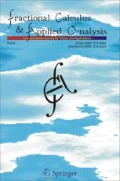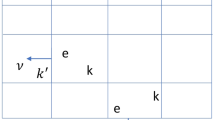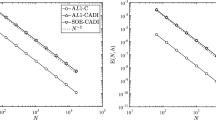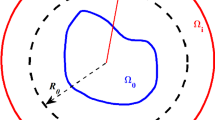Abstract
This paper is devoted to the numerical analysis of a piecewise constant discontinuous Galerkin method for time fractional subdiffusion problems. The regularity of weak solution is firstly established by using variational approach and Mittag-Leffler function. Then several optimal error estimates are derived with low regularity data. Finally, numerical experiments are conducted to verify the theoretical results.
Similar content being viewed by others
References
Ciarlet, P.: The Finite Element Method for Elliptic Problems. SIAM, Philadelphia, PA (2002)
Eriksson, K., Johnson, C., Thomée, V.: Time discretization of parabolic problems by the discontinuous Galerkin method. RAIRO Modél. Math. Anal. Numér. 19(4), 611–643 (1985)
Ervin, V., Roop, J.: Variational formulation for the stationary fractional advection dispersion equation. Numer. Meth. Part. D. E. 22(3), 558–576 (2006)
Evans, L.: Partial Differential Equations, 2nd Ed. American Mathematical Society (2010)
Ford, N., Xiao, J., Yan, Y.: A finite element method for time fractional partial differential equations. Fract. Calc. Appl. Anal. 14(3), 454–474 (2018). https://doi.org/10.2478/s13540-011-0028-2
Gao, G., Sun, Z.: A compact finite difference scheme for the fractional sub-diffusion equations. J. Comput. Phys. 230(3), 586–595 (2011)
Gao, G., Sun, H., Sun, Z.: Stability and convergence of finite difference schemes for a class of time-fractional sub-diffusion equations based on certain superconvergence. J. Comput. Phys. 280, 510–528 (2015)
Gorenflo, R., Kilbas, A., Mainardi, F. and Rogosin, S.: Mittag-Leffler Functions, Related Topics and Applications. Springer Monographs in Mathematics. Springer, Berlin (2014); 2nd Ed. (2020)
Karaa, S., Mustapha, K., Pani, A.: Optimal error analysis of a FEM for fractional diffusion problems by energy arguments. J. Sci. Comput. 74(1), 519–535 (2018)
Ke, R., Ng, M. and Sun, H.: A fast direct method for block triangular Toeplitz-like with tri-diagonal block systems from time-fractional partial differential equations. J. Comput. Phys. 303(C), 203–211 (2015)
Kufner, A., Persson, L. and Samko, N.: Weighted Inequalities of Hardy Type. World Scientific Publishing Company (2017)
Langlands, T., Henry, B.: The accuracy and stability of an implicit solution method for the fractional diffusion equation. J. Comput. Phys. 205(2), 719–736 (2005)
Li, B., Luo, H., Xie, X.: A space-time finite element method for fractional wave problems. Numer. Algor. 85(3), 1095–1121 (2020)
Li, B., Luo, H., Xie, X.: Analysis of a time-stepping scheme for time fractional diffusion problems with nonsmooth data. SIAM J. Numer. Anal. 57(2), 779–798 (2019)
Li, B., Wang, T., Xie, X.: Analysis of the L1 scheme for fractional wave equations with nonsmooth data. Comput. Math. Appl. 90, 1–12 (2021)
Li, B., Wang, T., Xie, X.: Numerical analysis of a semilinear fractional diffusion equation. Comput. Math. Appl. 80, 2115–2134 (2020)
Li, B., Wang, T., Xie, X.: Numerical analysis of two Galerkin discretizations with graded temporal grids for fractional evolution equations. J. Sci. Comput. 85(3), 85–59 (2020)
Li, B., Xie, X.: Regularity of solutions to time fractional diffusion equations. Discrete Contin. Dyn. Syst. -B. 24, 3195–3210 (2019)
Li, X., Xu, C.: A space-time spectral method for the time fractional diffusion equation. SIAM J. Numer. Anal. 47(3), 2108–2131 (2009)
Li, Z., Yan, Y.: Error estimates of high-order numerical methods for solving time fractional partial differential equations. Fract. Calc. Appl. Anal. 21(3), 746–774 (2018). https://doi.org/10.1515/fca-2018-0039
Lions, J., Magenes, E.: Non-Homogeneous Boundary Value Problems and Applications, vol. 1. Springer, Berlin (1972)
Luo, H., Li, B., Xie, X.: Convergence analysis of a Petrov-Galerkin method for fractional wave problems with nonsmooth data. J. Sci. Comput. 80(2), 957–992 (2019)
McLean, W.: Regularity of solutions to a time-fractional diffusion equation. ANZIAM J. 52(2), 123–138 (2010)
McLean, W., Mustapha, K.: Convergence analysis of a discontinuous Galerkin method for a sub-diffusion equation. Numer. Algor. 52(1), 69–88 (2009)
McLean, W., Mustapha, K.: Time-stepping error bounds for fractional diffusion problems with non-smooth initial data. J. Comput. Phys. 293(C), 201–217 (2015)
McLean, W., Thomée, V.: Maximum-norm error analysis of a numerical solution via Laplace transformation and quadrature of a fractional order evolution. IMA J. Numer. Anal. 30, 208–230 (2010)
McLean, W., Thomée, V.: Numerical solution via Laplace transforms of a fractional order evolution equation. J. Integral Equ. Appl. 22(1), 57–94 (2010)
Mohebbi, A., Abbaszadeh, M., Dehghan, M.: A high-order and unconditionally stable scheme for the modified anomalous fractional sub-diffusion equation with a nonlinear source term. J. Comput. Phys. 240(1), 36–48 (2013)
Mustapha, K.: Time-stepping discontinuous Galerkin methods for fractional diffusion problems. Numer. Math. 130(3), 497–516 (2015)
Mustapha, K., Abdallah, B., Furati, K.: A discontinuous Petrov-Galerkin method for time-fractional diffusion equations. SIAM J. Numer. Anal. 52(5), 2512–2529 (2014)
Mustapha, K., McLean, W.: Piecewise-linear, discontinuous Galerkin method for a fractional diffusion equation. Numer. Algor. 56(2), 159–184 (2011)
Mustapha, K., McLean, W.: Superconvergence of a discontinuous Galerkin method for fractional diffusion and wave equations. SIAM J. Numer. Anal. 51(1), 491–515 (2013)
Mustapha, K., McLean, W.: Uniform convergence for a discontinuous Galerkin, time-stepping method applied to a fractional diffusion equation. IMA J. Numer. Anal. 32(3), 906–925 (2012)
Sakamoto, K., Yamamoto, M.: Initial value/boundary value problems for fractional diffusion-wave equations and applications to some inverse problems. J. Math. Anal. Appl. 382(1), 426–447 (2011)
Samko, S., Kilbas, A., Marichev, O.: Fractional Integrals and Derivatives: Theory and Applications. Gordon and Breach Science Publishers, Switzerland-USA etc (1993)
Schötzau, D., Schwab, C.: Time discretization of parabolic problems by the \(hp\)-version of the discontinuous Galerkin finite element method. SIAM J. Numer. Anal. 38(3), 837–875 (2000)
Stynes, M.: Too much regularity may force too much uniqueness. Fract. Calc. Appl. Anal. 19(6), 1554–1562 (2016). https://doi.org/10.1515/fca-2016-0080
Stynes, M., O’Riordan, E., Gracia, J.: Error analysis of a finite difference method on graded meshes for a time-fractional diffusion equation. SIAM J. Numer. Anal. 55(2), 1057–1079 (2017)
Tartar, L.: An Introduction to Sobolev Spaces and Interpolation Spaces. Springer, Berlin (2007)
Thomée, V.: Galerkin Finite Element Methods for Parabolic Problems. Springer, Berlin (2006)
Wang, Y., Yan, Y., Yang, Y.: Two high-order time discretization schemes for subdiffusion problems with nonsmooth data. Fract. Calc. Appl. Anal. 23(5), 1349–1380 (2020). https://doi.org/10.1515/fca-2020-0067
Yan, Y., Khan, M., Ford, N.: An analysis of the modified L1 scheme for time-fractional partial differential equations with nonsmooth data. SIAM J. Numer. Anal. 56(1), 210–227 (2018)
Yang, Y., Yan, Y., Ford, N.: Some time stepping methods for fractional diffusion problems with nonsmooth data. Comput. Methods Appl. Math. 18(1), 129–146 (2018)
Yuste, S.: Weighted average finite difference methods for fractional diffusion equations. J. Comput. Phys. 216, 264–274 (2006)
Yuste, S., Acedo, L.: An explicit finite difference method and a new von-Neumann-type stability analysis for fractional diffusion equations. SIAM J. Numer. Anal. 42(5), 1862–1874 (2005)
Zhuang, P., Liu, F., Anh, V., Turner, I.: New solution and analytical techniques of the implicit numerical method for the anomalous subdiffusion equation. SIAM J. Numer. Anal. 46(2), 1079–1095 (2008)
Acknowledgements
This work was supported in part by National Natural Science Foundation of China (11771312). The authors would like to thank the Editor-in-Chief and the two anonymous reviewers for their helpful comments.
Author information
Authors and Affiliations
Corresponding author
Ethics declarations
Conflict of interest
The authors declare that they have no conflict of interest.
Additional information
Publisher's Note
Springer Nature remains neutral with regard to jurisdictional claims in published maps and institutional affiliations.
Appendix A. Some properties of fractional calculus operators
Appendix A. Some properties of fractional calculus operators
Lemma 10
([35]) If \( 0<\alpha , \beta < \infty \), then
for all \(v\in L^1(0,1)\), and if \( 0< \alpha< \beta < \infty \), then
for all \(v\in L^1(0,1)\). Moreover, for all \( v, w \in L^2(0,1) \),
Lemma 11
([3]) If \( 0< \gamma < 1/2 \) and \( v,w \in H^{\gamma }(0,T) \), then
Lemma 12
([22]) If \( v \in {}_0H^\beta (0,1;\dot{H}^r(\varOmega )) \cap {}_0H^\gamma (0,1;\dot{H}^s(\varOmega )) \) with \( \gamma ,\beta \geqslant 0\) and \( s,r\in {\mathbb {R}}\), then for all \( 0< \theta < 1 \),
Similarly, if \( v \in {}^0\!H^\beta (0,1;\dot{H}^r(\varOmega )) \cap {}^0\!H^\gamma (0,1;\dot{H}^s(\varOmega )) \) with \( \gamma ,\beta \geqslant 0\) and \( s,r\in {\mathbb {R}}\), then for all \( 0< \theta < 1 \),
Lemma 13
([22]) If \(\beta \geqslant \gamma >0\), then
where \(C_1\) and \(C_2\) depend only on \(\gamma \) and \(\beta \).
Lemma 14
([22]) If \(\beta ,\gamma \geqslant 0\), then
where \(C_1,\,C_2,\,C_3\) and \(C_4\) depend only on \(\gamma \) and \(\beta \).
Lemma 15
([22]) If \(0< \gamma <1/2\), then for all \(v \in {}_0H^1(0,1)\),
Moreover, if \(v\in {}_0H^{\gamma }(0,1)\) with \(1/2<\gamma \leqslant 1\), then for all \( 0<\epsilon \leqslant 1 \),
About this article
Cite this article
Li, B., Luo, H. & Xie, X. Error estimation of a discontinuous Galerkin method for time fractional subdiffusion problems with nonsmooth data. Fract Calc Appl Anal 25, 747–782 (2022). https://doi.org/10.1007/s13540-022-00023-5
Received:
Revised:
Accepted:
Published:
Issue Date:
DOI: https://doi.org/10.1007/s13540-022-00023-5
Keywords
- Time fractional subdiffusion (primary)
- Weak solution
- Low regularity
- Discontinuous Galerkin method
- Optimal error estimate
- Laplace transform




